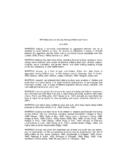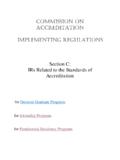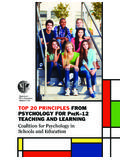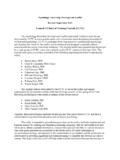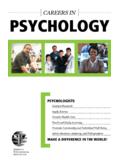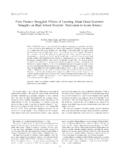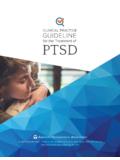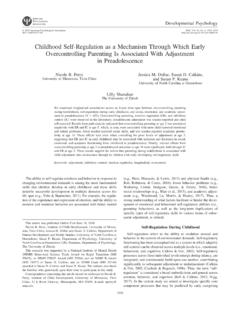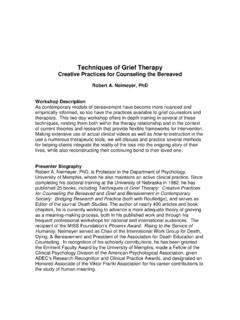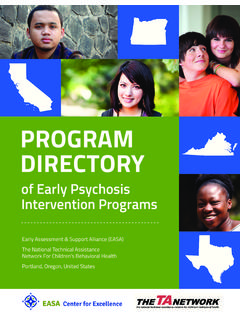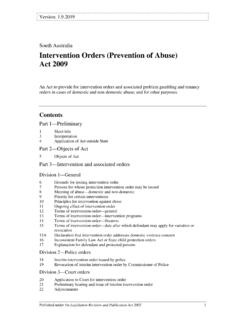Transcription of Psychological Impact of Human Trafficking and Sex Slavery ...
1 Psychological Impact of Human Trafficking and Sex Slavery worldwide : empowerment and Intervention Leah Kaylor Intern from John Jay College of Criminal Justice New York, NY The United Nations (UN) broadly defines Human Trafficking as the acquisition of people by improper means such as force, fraud or deception with the aim of exploiting them (UNODC, 2015). Specifically, my area of interest within the area of Human Trafficking is female sexual Slavery . Sexual Slavery : The Facts When Does It Become Trafficking ? The crime of sex Trafficking occurs when some form of (1) force, (2) fraud, or (3) coercion is used to make someone (usually a woman or child), engage in sexual activity without consent (UNDOC, 2015). Force can be physical or sexual abuse or restrictions of one s movement; fraud can be false promises of a different job in the host country or misrepresentation of the working conditions; and coercion can be threats of harm to the victim or victim s family or friends.
2 Who Are The Victims of Sex Trafficking ? The majority of sexually exploited Human Trafficking victims are women and children ( , girls and boys). A statistic from the International Labour Organization (2012) estimates that there are approximately 21 million victims of Human Trafficking globally, including million children. Victims differ in age, ethnicity, socioeconomic status, level of education, and country of origin. Although anyone can become a victim of Trafficking , certain populations are especially vulnerable to this form of victimization. Traffickers frequently target the following types of people: Undocumented immigrants Runaway and homeless youth Victims of trauma and abuse Refugees Impoverished individuals Which Countries Are Affected By Human Trafficking ? Human Trafficking affects every country in the world, be they countries of origin, in-transit countries, or countries as final destinations.
3 Trafficking typically originates in a developing country and victims are transported to high income countries. Victims are commonly trafficked within their country of origin and across international borders. The Physical Effects Sex Trafficking is a complex problem because the victims experience physical and Psychological harm. The traffickers use physical violence to dominate and control their victims. Some of the tactics include starvation, beatings, rape, and gang rape. Victims also experience violence and harm from some of the people who are purchasing the sex acts. Common injuries include broken bones, concussions, burns, and brain trauma. Victims can also experience gynecologic health problems that stem from forced commercial sex acts. They might suffer from sexually transmitted diseases, menstrual pain and irregularities, miscarriages, and forced abortions, among other problems. The Psychological Effects The Psychological Impact of victimization may be more severe than the physical violence (WHO, 2012).
4 Victims who have been rescued from sexual Slavery , typically present with various Psychological symptoms and mental illnesses, including the following: Post-Traumatic Stress Disorder (PTSD) Depression Anxiety Panic disorder Suicidal ideation Stockholm Syndrome Substance abuse Why Don t Victims Ask For Help? Many victims of Human Trafficking often do not self-identify as a victim initially. Some commonly blame themselves for what has happened. In these instances, seeking help may not be immediate. Additionally, sex traffickers often intentionally misidentify women and girls as "willing" participants in the sex trade, who make a free choice to be there. Finally, victims may not know their physical location and or may not speak or understand the local language. When victims seek help, they may encounter many challenges. Their traffickers typically exert tight physical and emotional control by doing the following: Confiscating their identification, cell phones, and money Forbidding communication with family or friends Monitoring and restricting movement.
5 Mental Health Recovery for Victims of Sexual Slavery The Psychological and physical trauma associated with Trafficking and performing sexual acts under duress can be devastating. Understanding the physical and Psychological harm that sex Trafficking inflicts will help in providing care and support. If the trauma is left unaddressed, it can undermine victims recovery and potentially contribute to vulnerability of re-victimization. Mental health professionals working with sexually exploited women and girls emphasize that trauma recovery is critical to a victim s ability to repair and regain her life (US Department of State, 2012). Building long-term, trusting relationships is at the heart of this therapeutic work, which requires time and flexible models of engagement and treatment, including group therapy with peers. In addition to group and individual trauma-specific counseling, a range of alternative therapies offer promise in helping victims build self-esteem, empowerment , and re-connection with themselves and society (US Department of State, 2012).
6 Mental health professionals and NGO workers must offer culturally sensitive outreach to victims. This includes informing them of safe houses and improving access to mental health services. Moreover, they must be trained to treat victims symptoms of trauma and mental illness within a cultural, linguistic, and religious context. The mental health needs of survivors of sex Trafficking are among the most complex of crime victims. They often benefit from a multidisciplinary approach to address severe trauma, medical needs, immigration and legal issues, financial problems, safety concerns, shelter, and other basic needs, and re-integration with their families of origin or acculturate to the host country. Global interventions Representatives at the UN have been working tirelessly to combat Human Trafficking . The UN Office of Drugs and Crime (2015) has funded support projects for victims of sex Trafficking worldwide .
7 NGO workers in numerous countries offer emotional and practical support, including health care, legal aid, and Psychological assistance (APA, 2014). One program that I would like to highlight to empower women to prevent or reduce Trafficking is the Khmer (Cambodia) Women s Cooperation for Development (KWCD) (2012). This organization launched a successful Trafficking prevention program. The program was designed to do the following: Empower young sex workers to negotiate for improved working conditions Provide workers with skills to save money Ultimately help them seek alternative employment options. Moreover, it trained women to act as peer educators in order to reach out to other women at risk of being trafficked. Finally, self-help groups offer peer counseling on issues such as the following: Self-defense from violence and harassment Access to health and legal services Skills to report cases of abuse Access to alternative employment opportunities.
8 Conclusion: Looking Forward Survivors of sex Trafficking can and do heal physically and psychologically, if able to access appropriate and culturally sensitive services and resources. In fact, former sex slaves are often the best resources in the fight against Human Trafficking because they have invaluable information regarding how to combat Human Trafficking as well as the most effective ways to help victims. UN officials, government leaders, in-country mental health professionals, and in-country NGO workers must collaborate on identifying effective interventions . They must work towards the goal of reducing sexual Slavery and assisting its victims. It is important for them to include former victims in the crafting of mental health, social support, and outreach services. This includes ensuring that the following services are: Appropriate within a specific cultural, linguistic, and/or religious context Gender-appropriate Capable of reaching victims ( , outreach) Comprehensive in scope to meet the full complement of needs of victims Focused on reducing the Psychological effects of trauma Building resilience and empowerment skills.
9 Reducing gender violence and promoting gender equality are fundamental aims of the United Nations post-2015 Global Agenda (UN, 2015). Addressing the sexual exploitation of women and girls is integral to this progress. References American Psychological Association. (2014). Report of the task force on Human Trafficking . Retrieved from: International Labour Organization, (2012). Global estimate of forced labour executive summary. Retrieved from Khmer Women s Cooperation for Development (2012). Human Trafficking . Retrieve from United Nations. (2015). Sustainable development knowledge platform. Retrieved from United Nations Office on Drugs and Crime. (2015). What is Human Trafficking ? Retrieved from #What_is_Human_Trafficking. United States Department of State. (2012). Addressing the internal wounds: The Psychological aftermath of Human Trafficking . Washington, DC: Office to Monitor and Combat Trafficking in Persons.
10 World Health Organization, (2012). Human Trafficking : Understanding and addressing violence against women. Retrieved from
